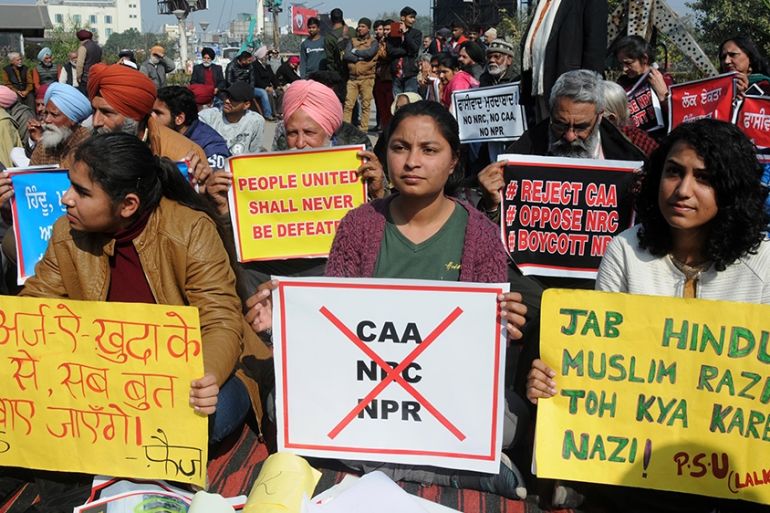Another US city passes resolution against India’s citizenship law
After Seattle, resolution by Cambridge city council in Massachusetts asks India to repeal the Citizenship Amendment Act.

Cambridge in Massachusetts state has become the second city in the United States after Seattle to pass a resolution against a controversial citizenship law pushed by India’s Hindu nationalist government headed by Prime Minister Narendra Modi.
The Cambridge City Council on Tuesday passed a unanimous resolution against the Citizenship Amendment Act (CAA), calling upon the Indian Parliament to “uphold” the country’s secular constitution by repealing the law and stopping a proposed National Register of Citizens (NRC).
Keep reading
list of 3 itemsIndia: Mother, school principal arrested over anti-CAA play
India’s BJP slammed for ‘offensive’ tweet on anti-CAA protesters
The US city houses the world-renowned Harvard University and Massachusetts Institutes of Technology.
“It has come to the attention of the city council that on December 11, 2019, the Indian Parliament passed the Citizenship Amendment Act, which for the first time uses religion as a criterion for Indian citizenship,” the resolution said.
The CAA fast-tracks Indian nationality for non-Muslim minorities from Muslim-majority Pakistan, Bangladesh and Afghanistan, who came to India before 2015. Critics have said it violates India’s secular constitution and have challenged it in the Supreme Court.
The CAA and NRC have triggered fears of marginalisation and disenfranchisement among India’s Muslim minority, who form nearly 15 percent of the country’s 1.3 billion population.
The Cambridge resolution declared that “Modi government’s racist and repressive policies” were inconsistent with the values of the city, “which welcomes South Asian communities of all castes and religions”.
The Cambridge city council urged its congressional delegation to support legislation in the US Congress censuring India for enacting such policies.
The move came a week after Seattle, one of the most powerful city councils in the US, passed a similar resolution, urging India to repeal the CAA and stop the NRC.
The two resolutions came ahead of an upcoming visit of US President Donald Trump to India.
‘Designed to disenfranchise Muslims’
Rachel Wyon, an activist in Cambridge who was born in India to British parents, told Al Jazeera that laws such as CAA echoed the Nazi Germany of the 1930s.
“Through the CAA, most of us can recognise the echo of the 1930s in Germany when a Nazi government took similar steps – closely parallel to the NRC and CAA – which we know now were initial steps towards the Holocaust,” said Wyon, who deposed before the city council in support of the resolution.
She said CAA and NRC are “unconstitutional and designed to disenfranchise several million Muslims, Dalits (people at the bottom of Hindu caste hierarchy) and other marginalised groups in order to move toward an ultra-right-wing fascist state”.
“People in India and the South Asian community in the US should know that they have the support of the world in opposing such a discriminatory law,” Wyon told Al Jazeera.
|
|
Modi’s government last November said it would implement a nationwide NRC, an exercise first conducted in the northeastern state of Assam, which effectively left nearly two million people – almost half of them Muslims – stateless, who now face being sent to various detention camps in the state.
However, following weeks of sometimes deadly protests against the CAA and a proposed NRC, the government earlier this month said it has not yet decided on creating a national register of its citizens.
‘Fundamentally discriminatory’
International bodies such as the United Nations, and rights groups Amnesty International and Human Rights Watch have expressed concern at the enactment of the CAA.
The UN High Commissioner for Human Rights has termed the law “fundamentally discriminatory in nature”.
The US Commission on International Religious Freedom has called upon the Trump administration to sanction India’s hardline home minister, Amit Shah, who is Modi’s closest aide.
Last month, the US witnessed protests in over a dozen cities by the Indian-American diaspora against the CAA and NRC on January 26, which is celebrated as India’s Republic Day.
The government of India, however, has repeated on several instances that CAA was its internal matter.
When Al Jazeera reached out to BJP spokesman GVL Narasimha Rao for his reaction to the resolutions passed by the two US cities, he said the matter was “insignificant to warrant our comment”.